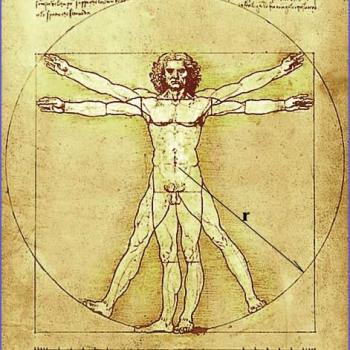
Actually, I am dealing with Lutheran bad boys in particular here, but perhaps some of what I talk about may be more broadly applicable.
(and for those inclined to diagnose me, I have never been nor ever will be a “charismatic figure” and/or “bad boy”, though, I confess that according to my flesh I have, pathetically and sinfully, imagined myself capable of being one – and imagined the “benefits” I might accrue thereby. “Ah, sounds like ‘sour grapes”‘ some may think.. : ) )
In the past, I have argued that we all think some persons are better than others and that we all try to guide the conscience of others – regardless of whether or not we are aware of this. This post, in part, expands on those statements more.
Another general truth claim now: It’s good to be concerned about being right (as in arguing for this vs. that), doing right, and even making the world right.
In short, all relatively healthy folks are concerned to be right, do right, and influence people to do the same. It is good to have a finely developed sense of what righteousness and wisdom entails, and to broadly work for this in our earthly lives.
This, contrary to the beliefs of some, is not being “self-righteous” or “holier than thou” – this is part of what it means to be a human being. Further, if it is true, as Paul Tripp says, that “self-righteousness is being more aware and irritated by the sins of others than you are conscious of and grieved by your own” (I’d say this is a symptom of self-righteousness) this is a statement that, in general, we should probably only use to diagnose ourselves.
So what are some ways to actually be self-righteous? (here is Luther with some help*) Well, for example:
- thinking that you are justified by God – that you may stand before Him and be accounted as righteous – for trying to be right, do right, and influencing people to do the same…
- not being willing to admit before God and man that you do and should try to be right, do right, and influence people to do the same (you, unlike those other people, do not seek to “guide the consciences of others”)
- lying to yourself that you should not try to be right, do right, and influence people to do the same (in which case you are, because you feel righteous, not willing to confess your lie to God)
Certainly, for all of us our sin – the depths of our abject selfishness, wickedness, rebellion, and self-deception! – goes deep. Very deep. And it makes sense that some of us, in part because of what has occurred in our life and how we have responded, have a much deeper grasp of just how sinful we are. This is a good thing. It produces humility in us, and makes us eager for correction.
But, is it possible that there is actually a Satanic mimic of this “sin awareness”? It seems to me – and God correct me if I am wrong (for we are always to put the best construction on all things) – that some Lutherans in particular are saying “…because I’m a bigger sinner than you – a real sinner – I ‘get’ grace while you – so obviously focused on ‘legal minutiae’ – clearly do not!”
And here, as Pastor Mark Suburg has pointed out, it is a short step to take to “the idea that [one’s] profligate sins of the past are part of a narrative that magnifies the grace and forgiveness of Christ”** – and to basically build one’s theology around this. He calls this the “Lutheran bad boy syndrome” – rather sophisticated bad boys though they may be…
This recently prompted me to personally write one of these pastors, and I said at one point:
“[…] recently tweeted: “The teacher should not try to astound the young with the gravity of his past sins; it will often have the opposite effect than was intended.” …many wise pastors I know over the years have made the same point – for example, some persons might get the idea that they have not really experienced true Christianity unless they have really lived life with this kind of passionate pursuit – sinful or otherwise…. “
Here is more Surburg, taking this back to the theology… to the Apostle Paul’s “therefore”:
“The danger is that when repeated again and again, the perspective on sin itself begins to shift. Sin becomes something that shows how great the forgiveness of Christ is, rather than something against which Christians are called to struggle. When paired with an understanding of the Christian life that is centered on Roman 7:14-25a it easily leads to an assumption that Christians will fail. Yet this in itself ceases to be a real problem because our failure in sin simply magnifies the grace and forgiveness of Christ, and this is what really matters.
However, Paul does not assume that Christians will fail. Instead while acknowledging the reality of failure in the Christian life, his discussion moves beyond Romans chapter 7 to say: “So then, brothers, we are debtors, not to the flesh, to live according to the flesh. For if you live according to the flesh you will die, but if by the Spirit you put to death the deeds of the body, you will live. For all who are led by the Spirit of God are sons of God. For you did not receive the spirit of slavery to fall back into fear, but you have received the Spirit of adoption as sons, by whom we cry, ‘Abba! Father!’” (Romans 8:12-15 ESV). Paul does not assume perfectionism. But he does believe that Christians are called to struggle against sin, and he believes that because of the work of the Spirit this struggle can and does succeed. The apostle extols the forgiveness found in Christ, even as he urges Christians to live as what Christ’ s Spirit has made them to be.”
I don’t think that the “Bad Boy Lutherans” Pastor Surburg is talking about think that the Christian will not struggle. But I do think they are at least tempted to believe that neither they – nor anyone else – will succeed in any meaningful way.
Even as they also, seemingly unawares, often give the impression they think they are the ones who are mature.
They are not like, for example, legalistic, cowardly and insipid pastors stuck in the rut of seeking security! At the very least, these deserve to be ignored, not engaged with seriously, not sympathized with, etc. No, the more radical Lutherans are the true holy ones who will boldly embrace the mission of the church! It is they who are the brave and righteous heroes – not only willing to embrace but seek out the multitude of sinners… addicts, ex-cons, prostitutes, the LGBT community, etc… They are unlike the legalistic Pharisee-types concerned only with their own security and the minutiae of the law… simply unwilling to really “get dirty with” and speak the radical gospel to “real” sinners.
In other words, one gets the distinct impression that with them, there is no longer any “we” in the church’s community of sinners. Bearing with one another in love has evaporated… The legalistic ones (the petite bourgeois?) – overly concerned about non-essential things like liturgical matters and Paul’s biblical “therefore” (“third use” matters– “Paul couldn’t control how the Spirit used the law. That didn’t stop him from exhorting/admonishing Christians to live in a godly way” [Surburg]) for example – can readily be left behind as true Lutheranism progresses.***
(And if I have been too harsh here or am just creating straw-men, I hope someone will love me enough to try and set me straight. Please help me to see where I am wrong)
Assuming I have put my finger on something real here, how can this happen – this kind of disdain for followers of Christ who, though very imperfect, truly do desire to share Him and His grace with others? What kind of teachings in particular could, at the very least, give aid and comfort to this kind of attitude?
I have a theory: a false understanding of the doctrine of predestination. In their view, anything which deviates from their predestinarian view focuses too much on the believer, who is no longer being seen as totally passive – as he should be. That explains why it is so easy for some to insist on saying things like “As St. Paul teaches, by grace the Spirit produces fruits. God’s Spirit produces God-pleasing works in and through us. The Holy Spirit alone.”
In sum, “I believe that I cannot by my own reason or strength believe in Jesus Christ, my Lord, or come to Him” merely becomes “I believe I cannot believe”. And when one cannot believe, one can hardly be expected to succeed in much of anything else. Whatever happens in life and however we are carried along – this is God’s will (this, it seems to me, is an issue that John Updike may have had)****
It is right to talk about the “radical Gospel” – where Christ alone, grace alone and faith alone are the battle cry! We are to be people completely focused on grace…always! Christ does save us completely! That said, the believer recognizes that Christ made him believe, and that from that point they have a continual choice to believe what God’s word says.
Finally, just because these Bad Boy Lutherans seem to deny:
- that God’s law can guide the Christian (they might say it guides the old Adam to his death)
- progressive sanctification
- synergism in sanctification
- that the Christian is partly sinner and partly righteous*****
- that marriage is a pre-fall institution (while not denying God meant for us to be some kind of monogamous one flesh union from the beginning)
- that confessional Lutheranism post-Luther has actually understood Martin Luther
…none of that means that they cannot be Christians (I’ve even re-tweeted some of those Bad Boys – because I appreciate the sweetness of the Gospel they have conveyed).
That said….
Strictly speaking, we are saved by Christ… with every “spirit and life” word that proceeds from His mouth. It is this theology that saves us, not our own faulty understandings of his words. That said, when the lies of the devil get a foothold, that true theology is always in danger of being completely shunned – and perhaps replaced not with atheism per se, but a “different Jesus” (2 Cor. 11).
This is ultimately why these matters are so important. Radical grace without the true Jesus is just another of Satan’s subtle lies.
FIN
Notes:
*Discussing 1 Corinthians 1:31, “He who boasts, let him boast in the Lord”, Luther says:
“Our heart must have this attitude and think: Oh Lord, if we were to reason together concerning my life and actions, I would not be able to stand, even if I were John the Baptist. For everything is not yet your gift, present, and mercy, but my life. But I boast in my goodness, and in being your servant, because you constantly give me gifts and because, as you promised to Abraham, you would be merciful to me through your Christ. If I am not good for myself, he is good for me. If I am not holy, he is holy. If I am not God’s servant, he is. If I am not without worry and fear, he is free of all worries and without fear, so that I thus soar out of myself into him and boast that I am good in and through Christ. Accordingly, he wishes us to boast that we are good and holy, but not by ourselves. For by ourselves, we must boast like desperate rogues.” (Vol. VI, Wittenberg edition, on the canticle of Zechariah (Luke 1:68-79))
Discussing 1 Peter 4:8, “Love covers also a multitude of sin”, Luther wrote words that made me pause before publishing this post:
“According to conceitedness, we always want to be the only ones who are beautiful; we do not see what is good in the neighbor, but put it out of our eyes. Wherever we see a little speck of dirt, we magnify it and make it so large that we cannot see anything that is good, even if it had the eyes of a falcon and the face of an angel. This is just as if I saw someone dressed in a golden robe that had somewhere a seam of white thread and then opened my eyes wide, as if the robe had become worthless thereby, while I saw myself as exquisitely dressed in my coarse jacket with a golden patch. Accordingly, we do not see the vices we are full of, while we cannot see anything that is good in other people. Now, where this natural vice rears its head among the true Christians, judging begins, so that I soon despise and condemn the other the moment he stumbles a little or is weak, and he treats me accordingly in return, measuring me with the same measure, and also seeks and reproves only the worst he can find in me. In this case, love is utterly suppressed. All that remains is that they bite and devour each other, until they have fully consumed one another and cease to be Christians.” (Vol. IV, Wittenberg ed., on Matthew 7)
I want to explicitly say that I see much that is good in the words of many Lutherans who might be glad to wear the label “Bad Boy Lutheran”. But that does not justify me, and there is much in my attitudes towards fellow Christians that is wrong.
**Luther did say: “We need the examples concerning the weakness of the saints, and they yield great comfort, more than the examples of the great excellent strength and other virtues the saints had. Accordingly, I cannot be improved much by the fact that David killed Goliath, bears, and lions. For in such chivalrous deeds of his I cannot follow him because they surpass all my powers and thoughts. For by such great deeds the saints are praised on account of their power and strength which they had as brave heroes. However, when we are presented with examples of the weakness, sins, terrors, and temptations the saints had; when I, for instance, read the lamenting and sighing, the terrors and cries of David, then I am lifted up exceedingly and am given great comfort. For when I see how they did not perish and die in their cries and terrors, but how they comforted and lifted themselves up by means of the promises, then I conclude that I too should not despair. (Luther, vol. XI, Wittenberg ed., on Genesis 28).”
If the Christian life was only about applying comfort to sinners terrified by God’s law (justification), this is all that we would need. But we need the saints holy examples as well to teach and encourage us in our lives of sanctification.
***In like fashion, as a friend of mine notes “during the Reformation, Andreas Carlstadt also complained about the bourgeois existence of the professor with the cushy academic job in Wittenberg – protected by his prince from all the “real” struggles of the day faced by the true, radical followers of Jesus…”
****As Pastor Holger Sonntag said to me: “…we’re not saved by our repenting (as such), but by our turning to Christ. Still, we need to repent — and by God’s grace, we will do so. Also, we’re not saved by our faith (as such), but by our faith in Christ. Still, we need to believe — and by God’s grace, we will do so.”
*****Sonntag again, in a discussion regarding the simul in Luther’s writings: ” it seems to me the “simul” can refer to totus — totus when we look at a person as a whole under God’s judgment of either law (totus peccator) or gospel (totus iustus by imputation of Christ’s righteousness etc.) — or it can mean partim — partim (or here: “two parts”) when we look at the Christian as both old Adam and new man locked in mortal combat (Rom. 7; Gal. 5: flesh vs. spirit). In other words the totus – totus takes the “outside” perspective; the partim-partim takes us inside the Christian.”













